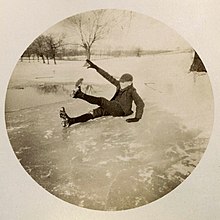Slipperiness


Slipperiness is when a surface has a low coefficient of friction, allowing objects to glide across the surface. People walking on slippery surfaces are likely to slip or fall. A surface can for example be slippery due to it being wet, or due to it being icy. There are several competing theories about why ice is slippery.
Road slipperiness is a major area of road safety, but various means have also been developed to measure walkway and deck slipperiness in order to develop health and safety standards.[1]
See also
[edit]- Floor slip resistance testing
- Ice cleats, used to prevent slipping when walking on icy roads
References
[edit]- ^ Wen-Ruey Chang, Theodore K. Courtney, Raoul Grongvist Measuring Slipperiness: Human Locomotion and Surface Factors 2002 0415298288 "A number of 'purely' subjective approaches (e.g. paired comparisons) have been applied to measure slipperiness. Human subjects seem to be capable of differentiating the slipperiness of floors (Yoshioka et al. 1978, 1979, Swensen et al."


 French
French Deutsch
Deutsch